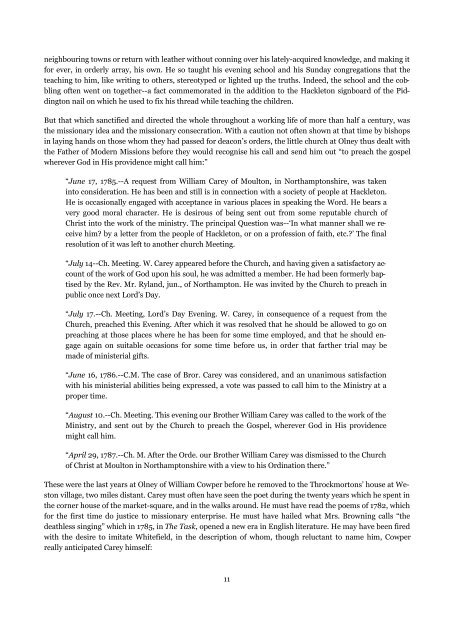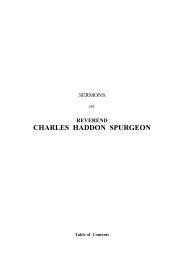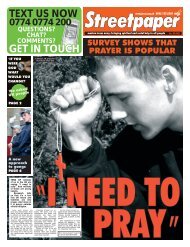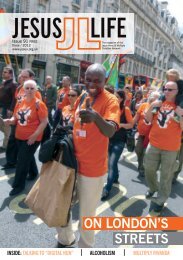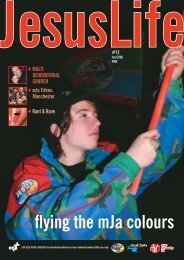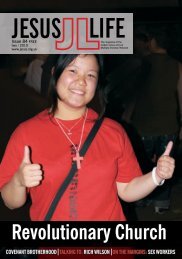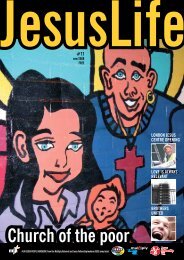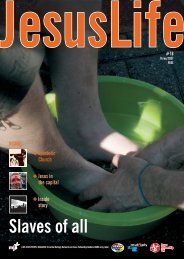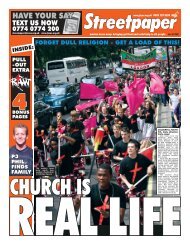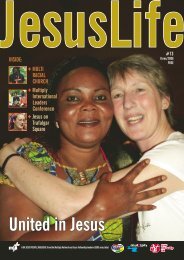Life of William Carey by George Smith - The Jesus Army
Life of William Carey by George Smith - The Jesus Army
Life of William Carey by George Smith - The Jesus Army
Create successful ePaper yourself
Turn your PDF publications into a flip-book with our unique Google optimized e-Paper software.
neighbouring towns or return with leather without conning over his lately-acquired knowledge, and making it<br />
for ever, in orderly array, his own. He so taught his evening school and his Sunday congregations that the<br />
teaching to him, like writing to others, stereotyped or lighted up the truths. Indeed, the school and the cobbling<br />
<strong>of</strong>ten went on together--a fact commemorated in the addition to the Hackleton signboard <strong>of</strong> the Piddington<br />
nail on which he used to fix his thread while teaching the children.<br />
But that which sanctified and directed the whole throughout a working life <strong>of</strong> more than half a century, was<br />
the missionary idea and the missionary consecration. With a caution not <strong>of</strong>ten shown at that time <strong>by</strong> bishops<br />
in laying hands on those whom they had passed for deacon’s orders, the little church at Olney thus dealt with<br />
the Father <strong>of</strong> Modern Missions before they would recognise his call and send him out “to preach the gospel<br />
wherever God in His providence might call him:”<br />
“June 17, 1785.--A request from <strong>William</strong> <strong>Carey</strong> <strong>of</strong> Moulton, in Northamptonshire, was taken<br />
into consideration. He has been and still is in connection with a society <strong>of</strong> people at Hackleton.<br />
He is occasionally engaged with acceptance in various places in speaking the Word. He bears a<br />
very good moral character. He is desirous <strong>of</strong> being sent out from some reputable church <strong>of</strong><br />
Christ into the work <strong>of</strong> the ministry. <strong>The</strong> principal Question was--‘In what manner shall we receive<br />
him? <strong>by</strong> a letter from the people <strong>of</strong> Hackleton, or on a pr<strong>of</strong>ession <strong>of</strong> faith, etc.?’ <strong>The</strong> final<br />
resolution <strong>of</strong> it was left to another church Meeting.<br />
“July 14--Ch. Meeting. W. <strong>Carey</strong> appeared before the Church, and having given a satisfactory account<br />
<strong>of</strong> the work <strong>of</strong> God upon his soul, he was admitted a member. He had been formerly baptised<br />
<strong>by</strong> the Rev. Mr. Ryland, jun., <strong>of</strong> Northampton. He was invited <strong>by</strong> the Church to preach in<br />
public once next Lord’s Day.<br />
“July 17.--Ch. Meeting, Lord’s Day Evening. W. <strong>Carey</strong>, in consequence <strong>of</strong> a request from the<br />
Church, preached this Evening. After which it was resolved that he should be allowed to go on<br />
preaching at those places where he has been for some time employed, and that he should engage<br />
again on suitable occasions for some time before us, in order that farther trial may be<br />
made <strong>of</strong> ministerial gifts.<br />
“June 16, 1786.--C.M. <strong>The</strong> case <strong>of</strong> Bror. <strong>Carey</strong> was considered, and an unanimous satisfaction<br />
with his ministerial abilities being expressed, a vote was passed to call him to the Ministry at a<br />
proper time.<br />
“August 10.--Ch. Meeting. This evening our Brother <strong>William</strong> <strong>Carey</strong> was called to the work <strong>of</strong> the<br />
Ministry, and sent out <strong>by</strong> the Church to preach the Gospel, wherever God in His providence<br />
might call him.<br />
“April 29, 1787.--Ch. M. After the Orde. our Brother <strong>William</strong> <strong>Carey</strong> was dismissed to the Church<br />
<strong>of</strong> Christ at Moulton in Northamptonshire with a view to his Ordination there.”<br />
<strong>The</strong>se were the last years at Olney <strong>of</strong> <strong>William</strong> Cowper before he removed to the Throckmortons’ house at Weston<br />
village, two miles distant. <strong>Carey</strong> must <strong>of</strong>ten have seen the poet during the twenty years which he spent in<br />
the corner house <strong>of</strong> the market-square, and in the walks around. He must have read the poems <strong>of</strong> 1782, which<br />
for the first time do justice to missionary enterprise. He must have hailed what Mrs. Browning calls “the<br />
deathless singing” which in 1785, in <strong>The</strong> Task, opened a new era in English literature. He may have been fired<br />
with the desire to imitate Whitefield, in the description <strong>of</strong> whom, though reluctant to name him, Cowper<br />
really anticipated <strong>Carey</strong> himself:<br />
11


